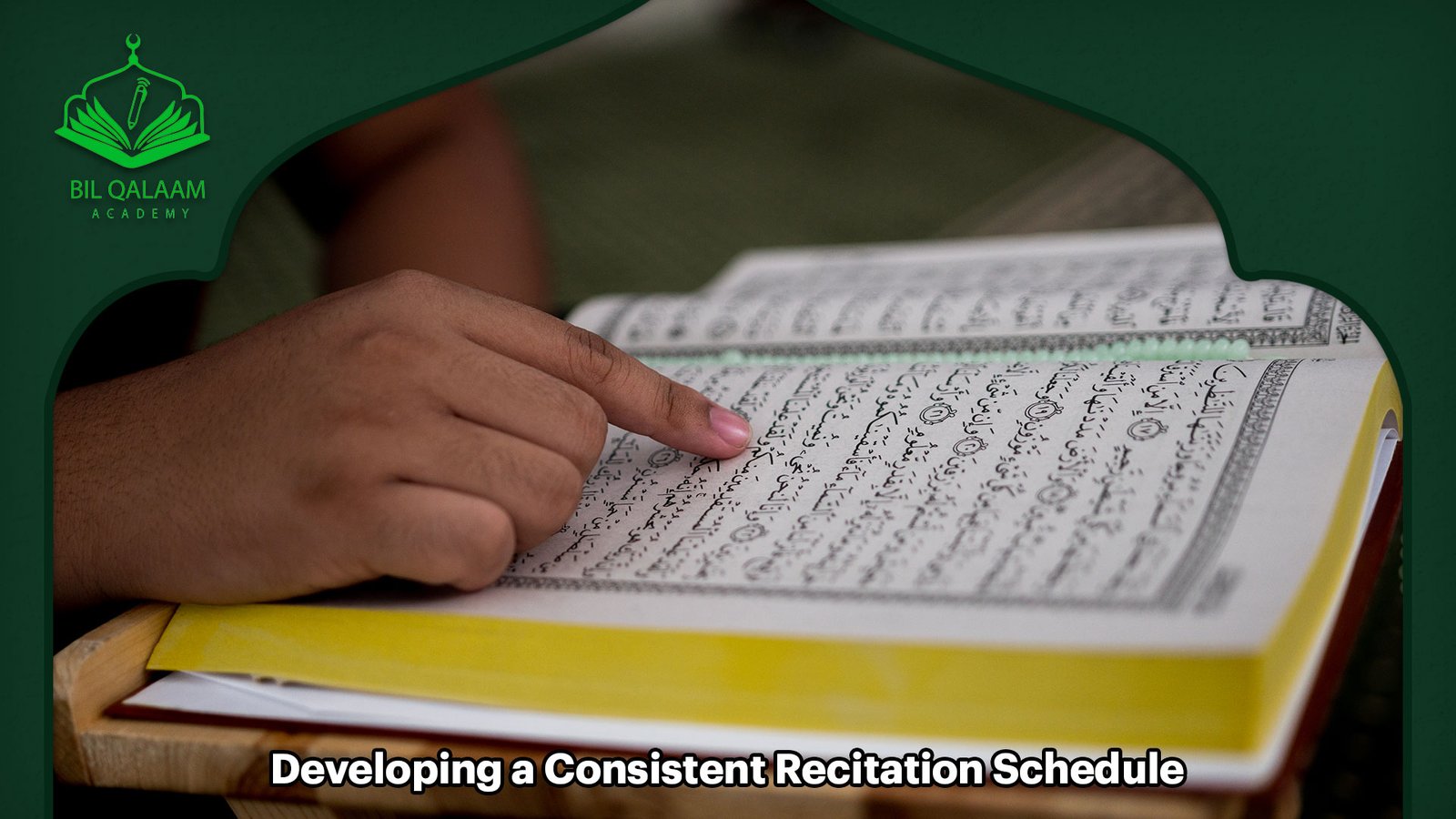Quran Recitation is one of the most rewarding acts of worship a Muslim can perform. It connects the heart to the words of Allah, strengthens faith, and revives spirituality.
Scholars and sheikhs from Egypt, Saudi Arabia, and other Islamic lands have dedicated their lives to preserving the original Arabic Quran recitation with precision and beauty.
Perfecting Quran recitation requires more than simply reading Arabic.
It involves Tajweed, consistent practice, and learning from qualified Quran recitation tutors.
Many students benefit from online platforms, such as the leading platform Blqlm Academy, which offers Quran recitation classes online for beginners and advanced learners alike.
Whether you are a beginner or an advanced student, perfecting your Quran recitation skills requires patience, dedication, and proper guidance.
With access to reciters, translations, audio recitations, and transliteration tools, perfecting holy Quran recitation (القرآن الكريم) has become easy and more accessible for people worldwide.
In this guide, we will explore step by step how, with dedication, practice, and the right resources, you can learn, recite, and perfect your Quran recitation.

Begin Perfecting Your Quran Recitation. At Blqlm Academy, we make it simple and inspiring for students, kids, and adults to learn, read, and recite the Holy Quran with tajweed.
Understanding the Basics of Quran Recitation
Understanding the basics of Quran recitation involves learning to properly pronounce the Arabic alphabet and words, following Tajweed rules for correct pronunciation and flow.
And developing the skill to read or recite the verses with accuracy and a pleasing rhythm and melody.
Key aspects include mastering the Makharij (pronunciation points) and Sifaat (attributes) of each letter, understanding symbols in the script, and practicing consistently with the guidance of a qualified Quran teacher.
Before diving into Tajweed rules, translation, or memorization (hifz), one must first understand the basics of Quran recitation.
The Quran was revealed in Arabic, a language rich in phonetics, rhythm, and precise word articulation.
Every Ayat carries spiritual depth, and mispronouncing a single letter could alter its meaning.
Learning to recite involves:
- Correct Pronunciation: Understanding how each Arabic letter is produced from its makhraj (point of articulation).
- Proper Rhythm: The Quran is not simply read like a normal book; it is recited with melody and flow.
- Listening and Repetition: Beginners must listen to the best Quran recitations by professional reciters and then repeat to imitate the beautiful recitations.
- Translation and Understanding: Along with Quran recitation, translations in English, Urdu, and other languages help students grasp the meanings more effectively.
With online programs, one can now browse, download, and play audio recitations from renowned reciters such as Sheikh Yusuf, Sheikh Muhammad, and others.
Institutes like the Blqlm institute also provide live Quran classes where expert teachers guide learners in both Quran reading and recitation.

Learning the Rules of Tajweed for Proper Pronunciation
Perfecting Quran recitation is impossible without learning the Quran with Tajweed.
Tajweed literally means “to make better.”
It is the science of pronouncing every letter of the Quran with its due characteristics.
To learn Tajweed Quran for proper pronunciation, find a qualified Quran tutor or attend structured Quran recitation classes for personalized feedback and guidance.
Supplement this by listening to expert reciters, using a Tajweed-marked Quran, practicing regularly, and recording your own recitations for self-assessment and improvement.
Key Tajweed Rules include:
- Makharij (Points of Articulation): Knowing where each sound originates (throat, lips, tongue).
- Sifaat (Characteristics of Letters): Such as heaviness, lightness, and elongation.
- Ghunnah (Nasal Sound): A rule for letters like Noon and Meem.
- Idghaam, Ikhfaa, and Iqlaab: Rules for combining and modifying sounds when letters meet.
Platforms like Blqlm Academy offer Tajweed ul Quran courses that make learning easier with step-by-step guidance, audio tools, and qualified teachers.
Their services are affordable, flexible, and suitable for both children and adults.
By following the Tajweed rules, learners ensure that they not only read correctly but also recite beautifully, in line with the tradition of the Prophet Muhammad (PBUH).
Start with Short Surahs to Build Confidence with Quran recitation.
For beginners, starting with long chapters like Surah Al-Baqarah may feel overwhelming.
Instead, begin with short surahs such as Surah Al-Fatiha, Surah Al-Ikhlas, Surah Yaseen, or Surah Al-Mulk.
However, to start Quran recitation and build confidence, begin with short, well-known Surahs like Al-Fatiha, Al-Ikhlas, Al-Falaq, and An-Nas.
And focus on clear pronunciation using correct Tajweed, listen to expert reciters to learn proper melody, and repeat the verses frequently.
Also, one must understand the meaning of the verses to connect with the Quran, and practice daily to build fluency and muscle memory.
Benefits of starting small surahs in Quran recitation:
- Easy to Memorize: Short Ayat are simple to recite and memorize.
- Confidence Building: Completing a surah gives learners motivation to continue.
- Perfect Practice: Allows focusing on applying the Tajweed rules properly.
Institutes such as the Balm Institute provide structured techniques for effective Quran reading programs where students progress gradually from short surahs to longer ones.
By listening to audio recitations, using apps, and accessing playlists, one can easily practice anytime.
The Role of Daily Practice in Perfecting Quran Recitation
Like any skill, Quran recitation requires daily practice.
Daily practice is essential for perfecting Quran recitation because it builds fluency, reinforces Tajweed rules, enhances understanding and spiritual connection, and fosters consistency in worship.
Through regular, dedicated practice for perfecting Quran recitation, even for short periods, learners gain accuracy, rhythm.
Also, confidence and a deeper appreciation for the sacred text make it a powerful act of devotion that strengthens one’s connection with Allah.
A consistent effort, even if only 10–15 minutes a day, yields incredible results.
Practical tips for perfect Quran recitation:
- Fix a time daily after Fajr or Isha for recitation practice.
- Use apps or radio programs to access Quran recitations with Tajweed online.
- Maintain a diary to track progress, noting the chapters and Ayat you recited.
- Alternate between reading from the mushaf (مصحف) and listening to audio recitations.
The leading platform, Blqlm Academy, encourages its students to practice with dedicated tutors who correct their mistakes in real time.

Listening to Professional Reciters to improve Quran recitation
Perfecting Quran recitation by listening to professional Quran reciters involves active listening and mimicking their techniques.
So, one of the best tools to improve Quran recitation is listening to expert reciters.
Their beautiful voices and mastery of Tajweed serve as a perfect model.
Some world-renowned reciters include:
- Sheikh Abdul Rahman Al-Sudais (Imam of Masjid Al-Haram, Makkah).
- Sheikh Mishary Rashid Alafasy.
- Sheikh Saad Al-Ghamdi.
- Sheikh Maher Al-Muaiqly.
You can browse, download, and play their recitations from Islamic platforms and apps.
Blqlm Academy also provides translations and transliterations in multiple languages, such as English, Hindi, and Arabic.
Listening to the best Quran recitations helps students develop correct tone, pronunciation, and rhythm.
This auditory method helps you internalize the correct sounds and melody, leading to better Quran recitation over time.
Recording Your Own Quran Recitation for Self-Improvement
Another effective method is to record your own recitation and then listen back.
This technique allows you to identify errors in Tajweed, rhythm, and reading fluency.
Benefits of Recording Your Own Quran Recitation:
- Self-Correction: You notice mistakes that go unnoticed during live recitation.
- Comparing with Experts: Match your audio with professional reciters.
- Tracking Progress: Old recordings show how much you have improved.
Some apps and tools also allow real-time feedback and rating of your Quran recitations, making it easier for beginners to correct themselves.
Correcting Common Mistakes in Quran Recitation
Correcting common mistakes to perfect Quran recitation with Tajweed involves must learning and applying Tajweed rules.
Such as proper articulation (Makharij) and elongation (Madd), through consistent practice, self-recording, listening to experts, using resources like Mushafs with stop signs.
And most importantly, receiving one-on-one guidance from a qualified Quran teacher.
Focusing on accuracy, understanding the meaning of verses, and practicing regularly helps to avoid errors in pronunciation that can alter the text’s intended meaning.
Beginners often face common errors in Quran reading, which need to be corrected early:
- Mixing Arabic Letters: Confusing similar sounds like ع (‘Ayn) and أ (Alif).
- Skipping Tajweed Rules: Ignoring elongation (Madd) or nasalization (Ghunnah).
- Incorrect Pausing: Stopping in the wrong place changes the meaning of the Ayat.
- Overreliance on Transliteration: While transliteration helps beginners, it should not replace learning Arabic.
Platforms like Blqlm Academy assign qualified Quran teachers to ensure students avoid these mistakes.
They also offer live tutoring services where learners can practice directly with expert teachers.

Developing a Consistent Recitation Schedule
Developing a consistent Quran recitation schedule means creating and adhering to a structured, regular plan for practicing memorization and Quran recitation to build a strong memory.
To foster spiritual growth and achieve recitation goals, such as committing the entire Quran to memory over time.
This schedule involves dedicating specific times each day for focused study, repetition, and review to ensure steady progress and long-term retention of the text.
So, to perfect Quran recitation, consistency is key.
Creating a daily or weekly recitation schedule keeps learners disciplined.
Sample Schedule:
- Morning (Fajr): Recite 1–2 pages from the mushaf.
- Afternoon: Listen to a recitation from your favorite sheikh.
- Evening (Isha): Practice the Tajweed rules with your teacher online.
- Weekend: Revise memorized surahs like Yaseen, Mulk, or Baqarah.
Institutes like the Blqlm institute offer a flexible program where students can join live online Quran classes at their convenience, making it easy to maintain a routine.
Seeking Guidance from Qualified Quran Teachers
No matter how many apps, playlists, or audio tools you use, there is no substitute for a qualified teacher.
A dedicated tutor can provide personalized guidance, correct mistakes instantly, and ensure learners follow the rules of Tajweed properly.
Benefits of learning with teachers:
- One-on-One Tutoring: Direct focus on your Quran recitation.
- Live Feedback: Corrections made during practice sessions.
- Structured Courses: From beginner to advanced levels.
- Hifz Quran Courses: Special guidance for memorizing the Qur’an.
Institutes such as the Blqlm institute are trusted sources offering professional teachers from Egypt, Graduates of Al-Azhar University, and beyond.
Quran recitation classes assist kids, adults, and beginners in learning the Qur’an with Tajweed, Tafsir, and translation.
In Conclusion, start Your Journey to Perfect Quran Recitation Today.
Perfecting Quran recitation is a beautiful journey that requires patience, dedication, and guidance.
By understanding the basics, learning Tajweed, starting with short surahs, maintaining daily practice, and listening to expert reciters, you can gradually transform your reading into a beautiful recitation.
With the help of modern online platforms like Blqlm Academy, learners now have access to expert teachers, live classes, and multiple resources in Arabic, English, Urdu, and other languages.
Whether you are a beginner, a child, or an adult, these institutes provide the right tools and programs to help you recite, understand, and even memorize the Qur’an with excellence.
By staying consistent, using available tools, and learning under the guidance of qualified teachers, you can achieve mastery in Quran recitation and experience the spiritual connection with Allah that only His holy words can provide.

